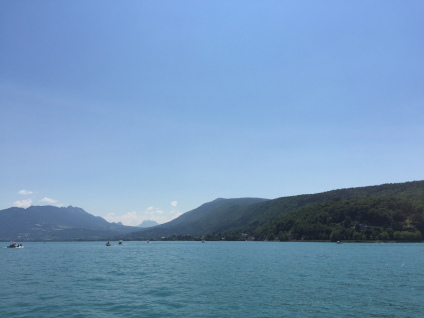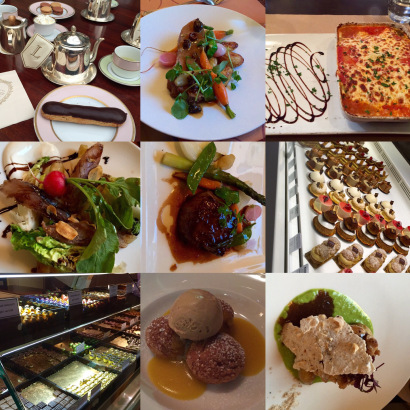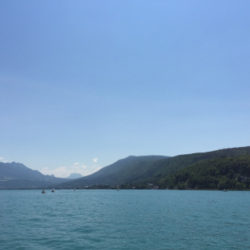Originally published July 2015
As I mentioned in a previous blog post, my brother is being crazy awesome and traveling Europe with American Music Abroad, a student honor musical tour group. We were talking the other day and he mentioned that there were things that he saw that he wasn’t expecting, and it reminded me that there were actually a fair amount of things I experienced in Lyon that were completely different, yet so mundane that no one deemed them important to tell me beforehand.
Water Is Not Free
One of the most obvious differences I noticed in pretty much all of the foreign countries I visited was that water at restaurants was not free, but rather approximately €2.50. Being someone who frequently orders a water at restaurants because I don’t want to spend as much, being charged for water is certainly a change. While at first I wasn’t pleased with this new development, I did begin to see the upside. When water is free, and you are trying to conserve your money, it makes sense to order a water. But as soon as it starts to cost you, it is more reasonable to sample a more local drink, one that is only a few euro more. This way, you not only get a delicious drink, but are also able to experience more of the culture through food. So while enjoying a lazy day by the Mediterranean in Barcelona is free, as is dipping your feet into the lake in Annecy, that water you order is most certainly not.

Grocery Stores: Where You Pay for Plastic Bags
Much like water in restaurants, we in America take something else for granted: plastic bags. Whenever I’m checking out at a store at home, the cashier scans the items, puts them in a plastic bag, I pay and go on my merry way. In Europe, that is not the case, which I learned the hard way. I went grocery shopping at Carrefour with some friends, and was buying enough food to last me a few weeks. I had paid, and then realized that none of my items were in bags. I figured it must just be a cultural difference, and grabbed some plastic bags to start filling up. Next thing I knew I was getting a stern talking to from the cashier in French, causing a minor panic, as I have no idea what I’m doing wrong. It turns out that each of the bags costs about five cents, so I had to awkwardly fish some coins out of my bag while holding up the entire line. On top of that, I had no idea how many bags I would need, so I ended up paying for way more than necessary. Only one other time did I not bring my own bags, and even then I found determining how many bags I would need stressful. While it certainly promotes being environmentally friendly, for someone who is unaccustomed to grocery shopping in another country, the entire process can be confusing.
Sunday? Closed.
Sundays at home are nice. I relax, study, maybe go out with some friends to have some fun before the next week of classes. I could also go an finish some chores, maybe pick up some food, get the housekeeping out of the way so it’s something less to worry about. In Lyon, that’s not the case. We arrived in Lyon on a Sunday, were brought to our dorms, and essentially told to start figuring out France on our own. While I usually love the ‘jump right in’ approach, having my first day be a Sunday made it rough. In general terms, everything is closed. Now there were definitely some shops open here and there, but for the majority of stores, Sunday means that the doors are closed. Which isn’t at all stressful when you haven’t eaten since the breakfast provided on the airplane over and no food was provided since. Thankfully my group had a student at CEFAM who knew what shops were open, so I was able to grab enough food for the next few meals, but having stores closed on Sunday was a definite change. I went traveling frequently on weekends, which caused me to have to be responsible and make sure that when I came back on Sunday, there was food ready for me. No longer was I able to pop into the local store and pick something up, or even find a restaurant to eat at, as these places that I take for granted at home as being open all the time just aren’t overseas.
Who Let the Dogs Out?
I love my dog. He’s almost a year old now and he’s the sweetest little thing around. And while I love him to death, I would never, ever, consider walking him around the block without a leash. For starters, if we are ever walking and he sees another person, heaven forbid another dog, he tries to go tearing off to say hi, disregarding the fact that there are cars on the road and not everyone appreciates a little white ball of fur charging at them to say hi. Yet in France I noticed that most of the time, when people were walking their dogs, the dogs didn’t have leashes. In fact, the owners of said dogs would walk, and if the dog didn’t come with them they would just keep walking. If the dog dawdled for too long, all the owner had to do was whistle or say ‘come along’ and the dog would come rushing to keep up. I have no idea if I just managed to come across dogs ready to compete in the obedience category in a dog show, or if all dogs are trained to listen 100% of the time, but I cannot fathom the idea of expecting Leo to come when I called and having him not go crazy every time he saw someone new.

No Passport, No Problem
When I was little and thought of traveling, I imagined having a passport filled with stamps, one from each country I visited. Walking into my Lyon trip, my image wasn’t that different. While I cared mostly about the amazing locations I was visiting, a part of me was still excited to have stamp after stamp in my passport. So imagine my surprise when I only got a stamp from Germany, the country my group initially flew into. Here I am, traveling to Spain, Italy, Germany, and parts of France, and only getting one, one from the country I spent the least amount of time in. There were even times when I was wondering if I had accidentally skipped customs because I was able to leave the airport without having my passport stamped. A few weeks into the trip I realized why: I was in the European Union (EU). The EU makes it very convenient for people coming into one country from another, as long as they are both in the EU. This thankfully makes traveling so much quicker, although it resulted in my passport being devoid of the numerous stamps I had hoped for.
The French and Their Fashion
French fashion is famous. The French are imagined as gorgeous people, wearing even more beautiful clothing. In preparation, I went out and bought some new clothes, clothes more fashionable, darker, and just all around nicer. I went to Lyon, imagining a world of haute couture. I did not get anything like that. I’m going to have to share a sad truth I discovered: French people dress just like everyone else. I’m sorry to burst the bubble that imagines French people as a species beyond the average human, but, quite frankly, the biggest difference I noticed was that French people in Lyon don’t wear shorts unless it’s boiling hot out (even though there is a sad lack of air conditioning in the country as well), and that yes, the colors were more muted. But even in Paris, I didn’t come back ever have noticing how well dressed people are, although that could be because Paris is overrun with tourists similar to myself. Maybe I am just so disinterested in fashion that I didn’t notice that everyone I interacted with looked like they came off the runway, but I am convinced that while Paris is the fashion capital of the world, the average French citizen dress is nothing extraordinary.
Cheap Eats
An important part of any culture is food. In France, that is no different, and in Lyon, the gastronomy capital of the world, food is even more important. Walking into Lyon, a city where food is so celebrated, I assumed that the food would be insanely expensive. I have never been so happy to be wrong. I had some of the best food I’ve ever had in my life, and for an inexpensive price. Potentially my favorite meal in Lyon started with a Lyonnais salad, my absolute favorite dish in Lyon, followed by a fantastic veal, and ending with a creme brûlée, the first I had ever tried (and loved). And all this, a meal that could cost near $50 in America, only cost me €18. And it wasn’t that the one restaurant was an anomaly, near all of the restaurants and bouchons had amazing food for an affordable price. Add on the fact that tipping isn’t common, meals were one of the most inexpensive parts of my time.

I imagine that if I didn’t spend so much time researching Lyon and France in general, the list of differences might have been much longer. What’s the most important takeaway however, is that no matter where you go, and no matter how many guide books, articles, or blogs you read, there will be things you experience that you never saw coming. Quite frankly that’s what makes traveling so fun. No matter how much you prepare, you can always be surprised by the unique qualities different cultures have.

Comments are closed